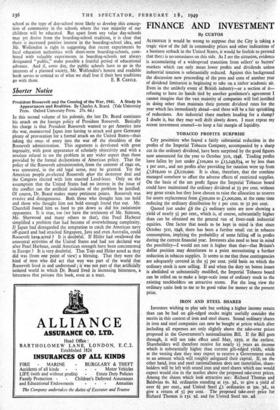FINANCE AND INVESTMENT
By CUSTOS
ALTHOUGH it would be wrong to suppose that the City is taking a tragic view of the fall in commodity prices and other indications of a business setback in the United States, it would be foolish to pretend that there is no uneasiness on this side. As I see the situation, evidence is accumulating of a widespread transition from sellers' to buyers' markets which can only mean lower profits and dividends unless industrial taxation is substantially reduced. Against this background the discussion now proceeding of the pros and cons of another year of dividend limitation is beginning to take on a rather academic air. Even in the unlikely event of British industry—or a section of
refusing to have its hands tied by another gentlemen's agreement I cannot imagine that the vast majority of companies will feel justified in doing other than maintain their present dividend rates for the year which lies immediately ahead—and there will be a fair sprinkling of reductions. Are industrial share markets heading for a slump? I doubt it, but they may well drift slowly down. I must repeat my recent investment counsel—to keep a fair margin of liquidity.
TOBACCO PROFITS SURPRISE City pessimists who feared a fairly substantial reduction in the profits of the Imperial Tobacco Company, accompanied by a sharp cut in the ordinary dividend, have been surprised by the good figures now announced for the year to October 31st, 1948. Trading profits have fallen by just under Doopoo to £13,249,854, or by less than per cent., and net profits after providing for taxation were up from £7,819,000 to £8,120p00. It is clear, therefore, that the combine managed somehow to offset the adverse effects of restricted supplies. On the basis of the net profit figure the Imperial Tobacco board could have maintained the ordinary dividend at 33 per cent. without any great strain but they have chosen to raise the allocation to reserve for assets replacement from £5oo,000 to £1,000,000, at the same time reducing the ordinary distribution by 1 per cent. to 32 per cent.
Quoted just under £6 the £t ordinary units are now showing a yield of nearly 5+ per cent., which is, of course, substantially higher than can be obtained on the general run of front-rank industrial equities. One factor that needs to be kept in mind is that since October 31st, 1948, there has been a further small cut in tobacco consumption, implying the probability of some falling off in profits during the current financial year. Investors also need to bear in mind the possibility—I would not rate it higher than that—that Britain's dollar position may deteriorate to a point necessitating a further reduction in tobacco supplies. It seems to me that these contingencies are adequately covered in the 5+ per cent. yield basis on which the ordinary stock is now selling. If and when the duty on bonus issues is abolished or substantially modified, the Imperial Tobacco board can be relied on to make a large-scale issue of ordinary stock to the existing stockholders on attractive terms. For the long view the ordinary units look to me to be goon value for money at the present price.
IRON AND STEEL SHARES Investors wishing to play safe but seeking a higher income return than can be had on gilt-edged stocks might usefully consider the merits in this context of iron and steel shares. Sound ordinary shares in iron and steel companies can now be bought at prices which after including all expenses are only slightly above the take-over prices proposed in the Government's nationalisation Bill. If the Bill goes through, it will not take effect until May, 1956, at the earliest. Shareholders will therefore receive for nearly ti years an income which is substantially higher than current gilt-edged yields, while at the vesting date they may expect to receive a Government stock to an amount which will roughly safeguard their capital. If, on the other hand, iron and steel nationalisation does not materialise, share- holders will be left with sound iron and steel shares which one would expect would rise in the market above the proposed take-over prices. Among the shares which look attractive are : Richard Thomas and Baldwins 6s. 8d. ordinaries standing at 15s. 3d., to give a yield of over 6+ per cent., and United Steel Li ordinaries at 3os. 3d., to give a return of 5+ per cent. The proposed take-over price for Richard Thomas is 15s. 3d. and for United Steel ;os. dd.






































 Previous page
Previous page